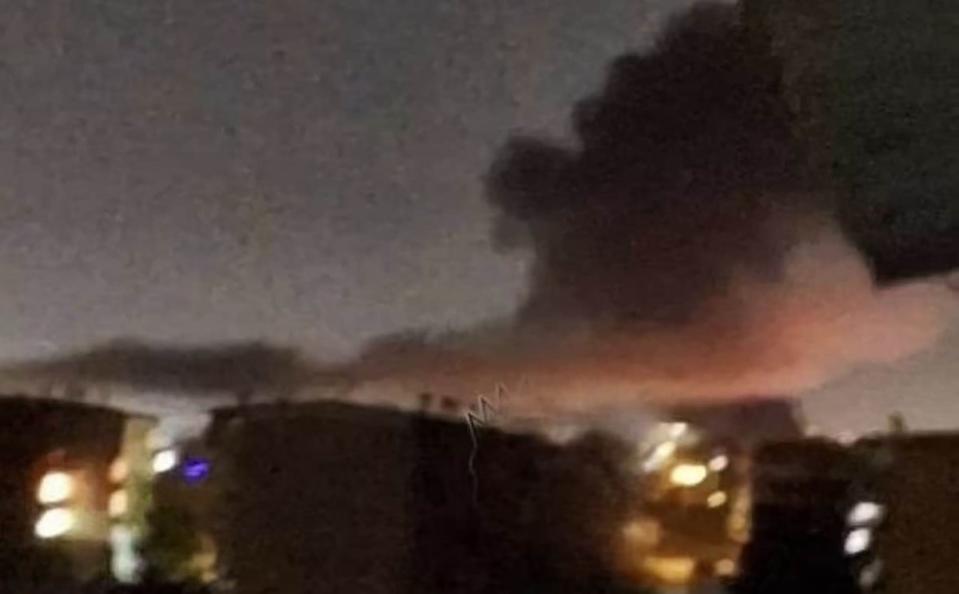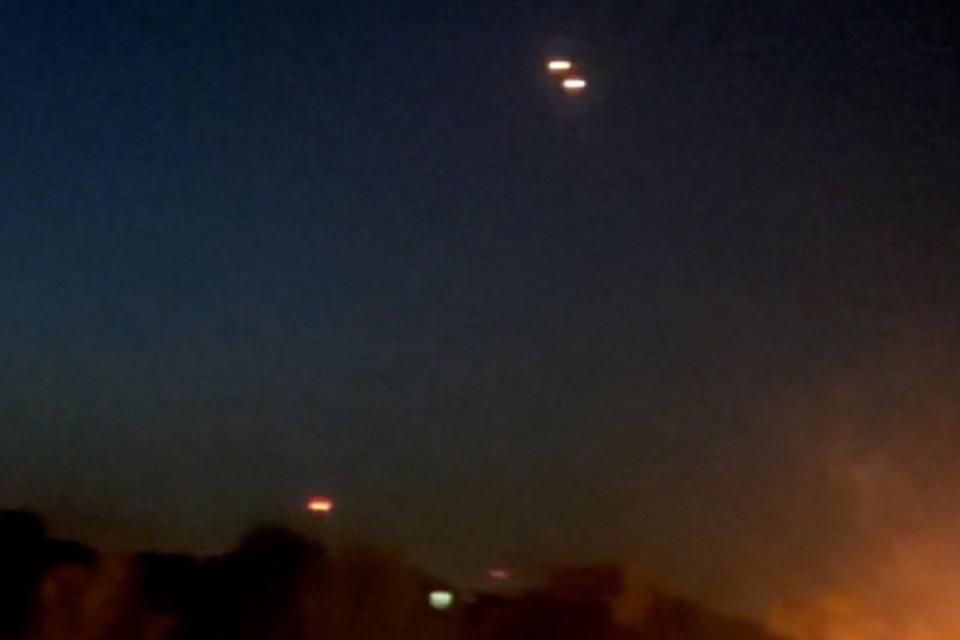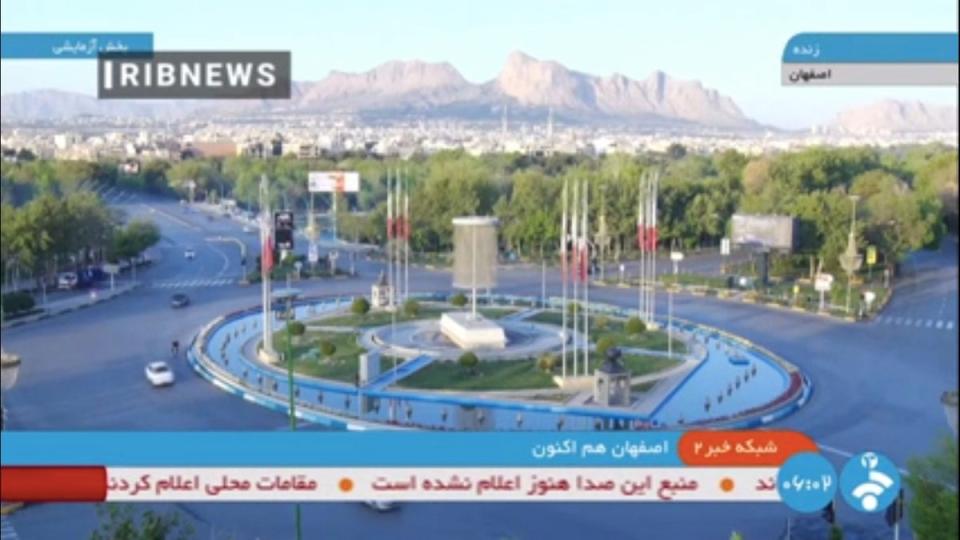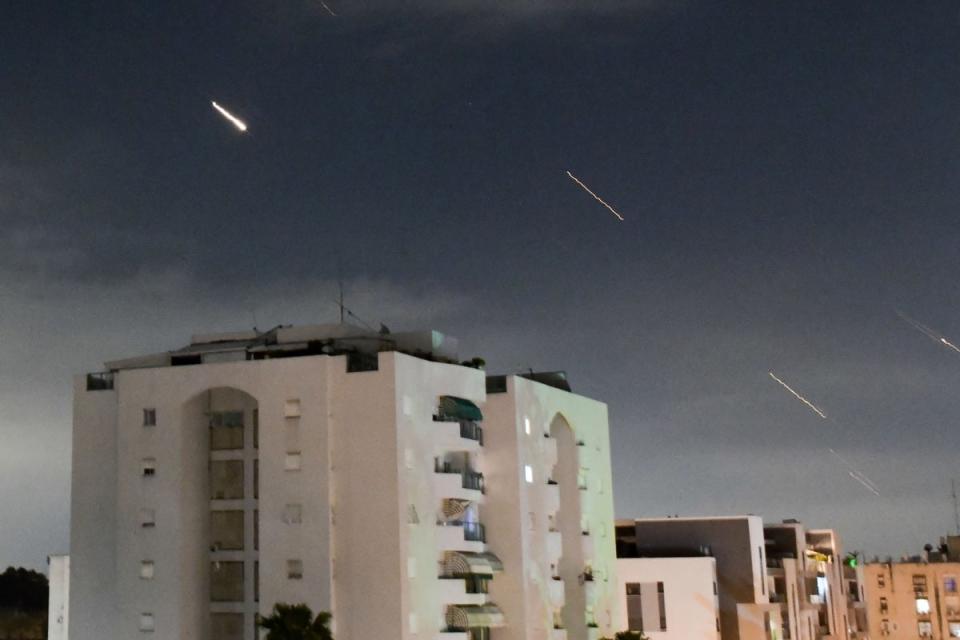Everything we know about Israel’s strikes on Iran as explosions rock Isfahan
Israel launched an attack on Iran overnight, less than a week after a full-scale attack by Tehran on Israeli territory last weekend.
Explosions could reportedly be seen near the central city of Isfahan, which is home to a major military airbase and a nuclear facility.
Iranian media reported three drones had been shot down after air defence systems were activated, and there have been no reports of injuries or damage so far. Israel’s leadership and military have so far not commented on the strike.
For live updates on the attack, visit our live blog by clicking here
But two US officials have told CBS News that an Israeli missile hit Iran. And a senior Israeli official told The Washington Post that the attack “was intended to signal to Iran that Israel can attack its territory”.
However, sources in Iran have told Reuters and the New York Times that the country had not been hit by an external attack.
Speaking at the G7 meeting in Capri, Italian Foreign Minister Antonio Tajani said the U.S. received “last-minute” information from Israel about the attack on Isfahan. U.S. Secretary of State Antony Blinken did not dispute that, but said: “We were not involved in any offensive operations.”
The attack came on Iranian Supreme Leader Ayatollah Ali Khamenei’s 85th birthday.

Here’s what we know so far:
What has happened
Explosions were reportedly heard near the Isfahan airbase after Iran fired air defences after spotting drones on Friday morning.
The country’s Fars and Tasnim news agencies reported the sound of blasts without giving a cause, while state television acknowledged a “loud noise” in the area, where a major nuclear facility is also based.
Tasnim then published footage showing two different anti-aircraft gun positions, suspected to be at the site of Iran‘s Uranium Conversion Facility at Isfahan.

A reporter said: “At 4.45, we heard gunshots. There was nothing going on. It was the air defence, these guys that you’re watching, and over there too.”
There have also been unconfirmed reports of explosions in the sky over the city of Tabriz, in the north west of the country.
What is Iran saying on the attack
Conflicting reports have surfaced over where the attack came from, and what it featured.
Iran appears to be downplaying the incident, with senior army commander Siavosh Mihandoust quoted by state TV as saying air defence systems had targeted a “suspicious object”.
An Iranian official told news agency Reuters there were no plans to respond against Israel for the incident. “The foreign source of the incident has not been confirmed. We have not received any external attack, and the discussion leans more towards infiltration than attack,” they said.
And three Iranian officials told The New York Times the attack included small drones that may have been launched from inside Iran. They added that radar systems didn’t detect unidentified aircraft that entered Iran’s airspace.

Also on state TV, an analyst said that the attack consisted of mini drones launched by “infiltrators from inside Iran”. No urgent meeting of the Iran’s High National Council called, it also reported.
What Israel is saying on the attack
On Friday morning so far, Israel’s leadership and the military have not commented on the attack.
However, two US officials have told CBS News that an Israeli missile had hit Iran, but they would not reveal the location or extent of the strike.
And a senior Israeli official has told The Washington Post that the attack “was intended to signal to Iran that Israel can attack its territory”.
But in Iran, there has been a direct denial of any missile attack, with the spokesperson for the country’s National Centre of Cyberspace, Hossein Dalirian, writing on X: “There has been no air attack from outside borders to Isfahan or other parts of the country.”
Impact of the attack
With little mention of the attack on state media, not much is known on the impact with no damage or casualties yet reported.
Isfahan is home to Iran’s several nuclear sites along with a major military air base, and the nearby city of Natanz is one of Iran’s nuclear enrichment sites.
The International Atomic Energy Agency, said there had been no damage to the country’s nuclear sites.
But the UN watchdog said it was continuing to monitor the situation very closely and called for extreme restraint from all sides, stressing that nuclear facilities should never be a target in military conflicts.

Why would Israel launch an attack?
Over the past week there has been speculation over how Israeli would respond to Iran’s attack on Saturday night.
More than 300 drones and missiles were fired at Israel by Iran. None of the drones crossed into Israeli territory as they were shot down by Israel and its allies, including the UK and Jordan.
Iran said it launched that attack in response to an assault on an Iranian consulate in Syria that killed seven officers, including two generals.
Israel’s allies since called for restraint as the country weighed up its response.
Isfahan, which is 250 miles south of Tehran, could have been a target due to it being home of a large airbase, a major missile production complex and several nuclear facilities including its underground Natanz enrichment site, which has been repeatedly targeted by suspected Israeli sabotage attacks.
The airbase is where a fleet of American-made F-14 Tomcats - purchased before the 1979 Islamic Revolution - are located.
Reaction worldwide so far
Country officials have pushed for de-escalation in the region in the wake of last night’s attack.
Prime Minister Rishi Sunak called “calm heads”. Answering a question after a speech on welfare reform, he said: “As I said to [Israel] Prime Minister [Benjamin] Netanyahu when I spoke to him last week, and more generally, significant escalation is not in anyone’s interest. What we want to see is calm heads prevail across the region.”
The president of the European Commission, Ursula von der Leyen, reacted to the attack while speaking from Lappeenranta in eastern Finland. She said: “It is absolutely necessary that the region remains stable and that all sides restrain from further action.”
Dutch Foreign Minister Hanke Bruins Slot wrote on X: “The recent developments in the Middle East are deeply worrying. It is of paramount importance that further escalation is prevented.”
Italian foreign minister Antonio Tajani also called for “absolute de-escalation” while his Canadian counterpart Melanie Joly said: “We are monitoring the situation closely. We will address the situation with the foreign ministers at the G7 session this morning in Italy.”
China’s foreign ministry spokesman said: “China opposes any action escalating tensions in the Middle East after the Israeli attack on Iran.”
On Friday afternoon, US Secretary of State Antony Blinken said he was committed to Israel’s security, adding when asked about Israel’s strikes on Iran that the US has not been involved in any offensive operation.


